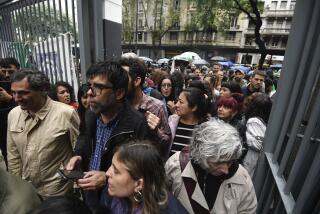Striking workers march in Europe
Reporting from Paris — Thousands of European workers took their battle against punishing public spending cuts to the streets Wednesday, a show of force that came as governments struggle to reel in high deficits at a time of sluggish economic growth.
Striking workers marched in cities from Athens to Bucharest, protesting cuts to jobless benefits, public service wages and pensions that threaten to undo the European social welfare model.
Most of the marches were peaceful. But there was violence, too: in Barcelona, where demonstrators clashed with police and in Greece, where a three-week-long truckers strike led to shots being fired at a convoy of police-escorted trucks that were delivering goods despite the strike.
The economically troubled European countries are trying to cut their spending and demonstrate financial strength to investors and others, but are seeing the labor unions challenge their proposals as harmful to workers.
Demonstrations Wednesday included a gathering in Brussels of union representatives from about 30 countries, according to protest organizers. Thousands of protesters participated in marches on buildings associated with the European Union, according to union representatives and police.
“No to austerity, employment and growth are priorities,” read one sign in Brussels.
In Spain, a rare national strike had buses and regional trains functioning at a snail’s pace, in protest against emergency austerity measures by Prime Minister Jose Luis Rodriguez Zapatero’s Socialist government.
“The cuts are bad for the people,” said Violeta Doval, 29, a protester in Madrid, and a sociologist. “These measures don’t touch the cause of the situation, and they won’t create employment.… The first thing the government did was to help the banks by giving them a lot of money, and then a little later they want to solve the problem by just taking money from the workers.”
Spain’s deficit of over three times the European Union standard of 3% of gross domestic product, has spooked international markets fearful of a scenario that led to the near bankruptcy of debt-ridden Greece this year.
Under international pressure, Spain has promised cuts in public sector salaries, unemployment checks and pensions, while reducing job security benefits and making it easier for companies to fire workers.
As in other parts of Europe, protesters in Spain complained that the new cuts have come too strong, and too fast, from foreign decision-makers who don’t have their country’s sovereign interests at heart.
“People on the outside are telling us what to do,” Doval said. “The European Union hasn’t been helpful during the crisis, they have only put on pressure, and they don’t know what is best for our people, like social measures that are really needed.”
Zapatero’s austerity plan, which is not expected to undergo major changes in reaction to the strikes, surprised many Spaniards because the program is considered typical of right-wing policy, and appears to contradict their leader’s leftist electoral promises.
Spanish Labor Minister Celestino Corbacho told journalists the effect of the strike was limited. Protesters in Barcelona and other parts of Spain clashed with police, and unions reportedly said more than 10 million Spanish workers went on strike.
Transportation workers and doctors were among the protesters in Greece, and in Dublin a cement truck blocked the gates of the Irish Parliament to protest government bank bailouts. The words “Toxic Bank” were written on the truck.
In France, strikers have been holding regular protests against a government reform bill that will raise the minimum retirement age from 60 to 62 to reduce the deficit. A government plan revealed Wednesday calls for cuts in civil servant jobs and other measures.
John Monks, general secretary of the European Trade Union Confederation, told reporters that labor leaders considered the strike an effective tool for reaching government officials even as difficult times continue.
“Today was a great success for European workers, and a clear signal to European leaders,” Monks said. “You can no longer only listen to the markets, you can no longer not listen to the anger of workers.”
Lauter is a special correspondent.
More to Read
Sign up for Essential California
The most important California stories and recommendations in your inbox every morning.
You may occasionally receive promotional content from the Los Angeles Times.










